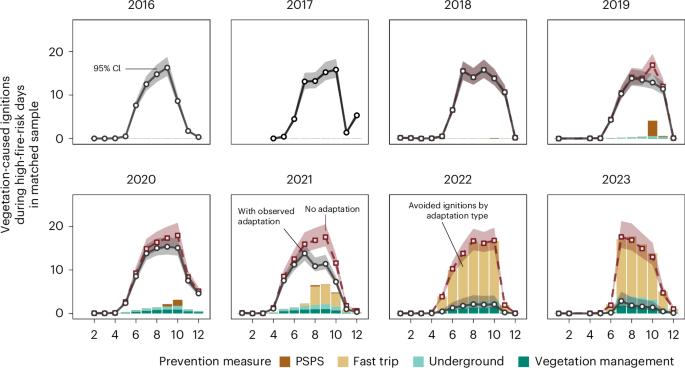Dynamic grid management reduces wildfire adaptation costs in the electric power sector
IF 27.1
1区 地球科学
Q1 ENVIRONMENTAL SCIENCES
引用次数: 0
Abstract
Wildfire is among the fastest-growing economic risks of climate change, yet cost-effective adaptation strategies remain underexplored. In the electric power sector, where utility infrastructure has ignited some of the most destructive fires, companies are investing heavily to reduce risk. Here we evaluate the costs, reliability implications and risk-reduction benefits of the largest utility wildfire mitigation programme in the United States. Using weather and vegetation data for 25,000 miles of high-risk power lines, we develop a predictive model of ignition risk and compare outcomes across locations that had similar risk profiles but received different interventions. A newer strategy—adjusting protective device sensitivity during high-risk conditions—has reduced more wildfire risk at lower cost per avoided structure burned than conventional approaches such as undergrounding or vegetation management. Our results underscore the importance of comprehensive accounting of costs, risks and reliability when evaluating adaptation investments, particularly where capital-intensive measures may be over-incentivized. Extreme events are increasingly becoming severe risks to the electric grid, yet there is limited understanding of the cost-effectiveness of adaptation investments. This research demonstrates that dynamic grid management could reduce large capital spending and limit wildfire risks in the USA.

动态电网管理降低了电力部门的野火适应成本
野火是气候变化中增长最快的经济风险之一,但具有成本效益的适应战略仍未得到充分探索。在电力行业,公用事业基础设施引发了一些最具破坏性的火灾,企业正在大举投资以降低风险。在这里,我们评估了美国最大的公用事业野火缓解计划的成本、可靠性影响和降低风险的好处。利用25000英里高风险输电线的天气和植被数据,我们建立了一个着火风险的预测模型,并比较了风险概况相似但采取不同干预措施的地点的结果。与传统方法(如地下或植被管理)相比,一种新的策略——在高风险条件下调整保护装置的灵敏度——以更低的成本降低了每个避免燃烧的结构的野火风险。我们的研究结果强调了在评估适应投资时全面核算成本、风险和可靠性的重要性,特别是在资本密集型措施可能被过度激励的情况下。极端气候事件正日益成为电网面临的严重风险,但人们对适应气候变化投资的成本效益了解有限。这项研究表明,动态电网管理可以减少大量的资本支出,并限制美国的野火风险。
本文章由计算机程序翻译,如有差异,请以英文原文为准。
求助全文
约1分钟内获得全文
求助全文
来源期刊

Nature Climate Change
ENVIRONMENTAL SCIENCES-METEOROLOGY & ATMOSPHERIC SCIENCES
CiteScore
40.30
自引率
1.60%
发文量
267
审稿时长
4-8 weeks
期刊介绍:
Nature Climate Change is dedicated to addressing the scientific challenge of understanding Earth's changing climate and its societal implications. As a monthly journal, it publishes significant and cutting-edge research on the nature, causes, and impacts of global climate change, as well as its implications for the economy, policy, and the world at large.
The journal publishes original research spanning the natural and social sciences, synthesizing interdisciplinary research to provide a comprehensive understanding of climate change. It upholds the high standards set by all Nature-branded journals, ensuring top-tier original research through a fair and rigorous review process, broad readership access, high standards of copy editing and production, rapid publication, and independence from academic societies and other vested interests.
Nature Climate Change serves as a platform for discussion among experts, publishing opinion, analysis, and review articles. It also features Research Highlights to highlight important developments in the field and original reporting from renowned science journalists in the form of feature articles.
Topics covered in the journal include adaptation, atmospheric science, ecology, economics, energy, impacts and vulnerability, mitigation, oceanography, policy, sociology, and sustainability, among others.
 求助内容:
求助内容: 应助结果提醒方式:
应助结果提醒方式:


